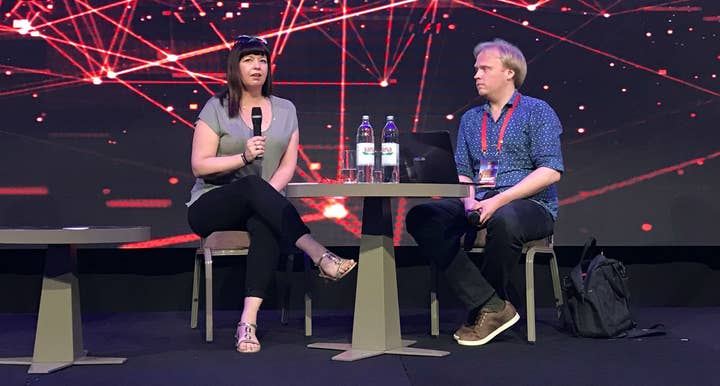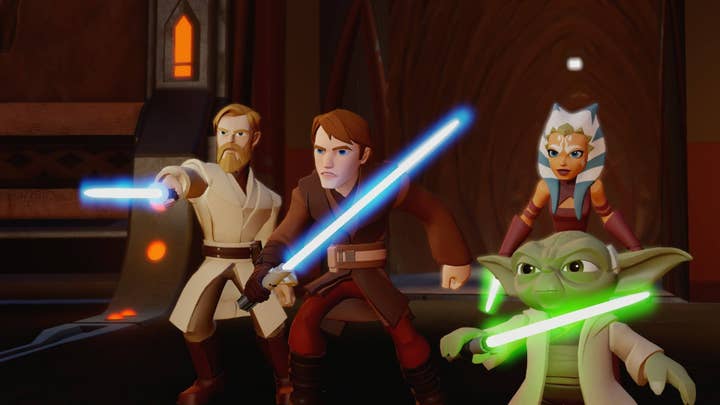How to stop big publishers breaking your business
During this year's Reboot Develop, Ninja Theory's Nina Kristensen detailed the rights studios should fight for
Working with a major publisher can be life-changing for any developer but if the partnership falls apart, it's the latter that suffers the most.
This was a topic discussed during an onstage interview with Nina Kristensen, co-founder and development director at Hellblade creator Ninja Theory, during the recent Reboot Develop conference in Croatia. Hosted by GamesIndustry.biz editor-in-chief Matt Handrahan, the conversation turned to forms of protection some developers might not be aware of.
"There are a few clauses that if you don't already do them, then you absolutely should and you should fight for them," Kristensen said. "One of them is the termination for convenience clause. Big publishers, for the most part, their lawyers will say they don't do that or they'll give you something minimal around it, but this is an essential clause that you absolutely must fight for."
"Big publishers will say they don't do termination for convenience, but this is an essential clause that you absolutely must fight for"
The termination for convenience clause comes into effect when a developer has been delivering a game on schedule, meeting all its milestones, but the project is then impacted - perhaps even cancelled - by a change in the publisher's strategy.
"Maybe they stop making games altogether - that has happened to us - or maybe they no longer want to make mature games, only teen and below, but yours is mature and you no longer fit into their portfolio," Kristensen offered by way of example.
"There can be any number of reasons that are absolutely nothing to do with you as a developer but it means that you get canned - and there's fuck all you can do about it, absolutely nothing, because it's a big corporation that has changed tack."
As the director says, Ninja Theory has experienced this first-hand - most recently in 2016 when Disney decided to pull out of video games publishing. The Cambridge-based studio had been working with the entertainment giant for years on the Disney Infinity range, but then had this source of revenue and business unexpectedly removed.
We recently looked at the impact this had on Essex-based indie Dlala Studios, which had a $3.5 million deal to reboot one of Disney's biggest franchises. That company was able to survive the Disney retreat, as was Ninja Theory thanks to this clause.
Termination for convenience means that, as Kristensen put it, "you get paid a bunch of money for them to conveniently terminate the contract". It's a lump sum that should help keep the studio afloat until its management is able to secure more business or funding, with Kristensen urging developers to think about how long that process takes and what their costs will be in the meantime.
"That's how much money you need so that your company doesn't go bust because someone else has chosen to do something that you have no control over and you've been doing a good job all of the way along," she said.
"If you're small and you're working with a behemoth multi-national corporation, their lawyer will go 'no', and you might think that's just how things are. It isn't. You're not being unreasonable, you're just safeguarding your business."

Kristensen also encouraged developers to make sure they have protected their technology, which can encompass all manner of assets and developments created during a work-for-hire project.
"This is really important," she stressed. "Let's say we're making games for another party, we're working with their IP, so obviously they own that IP, they own that franchise and they own the content you make for them, and that's fine and correct. But along the way of making the game you develop a body of technology, you create generic assets, you create all sorts of things that are of value to you and that you want to bring to bear in the next game.
"The ability to say no, reasonably, is always going to be in good faith. Publishers are not bad people but sometimes legal departments can take on a life of their own"
"At Ninja Theory, we have an enormous body of tech and generic assets, and we always own that and we grant the licence to the publisher to use it in the game. And that's correct, because one of the reasons to come to us is that we have this huge body of work and you have a headstart - we'd never create a human mesh from scratch, we've got loads so we take one that's appropriate and use that as a starting point. Whatever character we create ultimately is owned by the publisher but the generic mesh is ours."
The Ninja Theory director emphasised that this should not just apply to technology your studio has created prior to such a partnership, but also anything you invent during the course of the project - whether it's an enhancement to your previous tech or new assets you can (and most likely will) use later.
"That's something everyone will fight you on but the argument is sensible and sound: all of this work you've had in the past, you're bringing to bear on their project and they're getting a lot more value for money from you because of that," Kristensen explained. "In exchange, whatever you make along the way... it makes complete sense, and when you talk it through with a publisher, they'll be like 'oh, yeah, that makes sense'. The immediate [response] is 'we're paying for it, we should own it', but that's not correct."
If a developer is unsure whether the terms of a partnership are fair, or feel like they're unlikely to benefit in the long term, they should have no qualms about walking away and finding something different. Kristensen says this option is "essential" to the survival of a studio.
"I have said no to deals in the past where the terms have been really bad for us," she said. "It might pay payroll today but... we'll wind up circling the drain [in the long term]. Say no early, because the fact of the matter is if the person you are trying to work with is reasonable and actually wants to get this deal done, they'll [realise] if they don't make an accommodation for you as a developer, you'll cease to exist and they don't get their game anyway.
"The ability to say no, reasonably, is always going to be in good faith. Publishers are not bad people, they're not bad organisations but sometimes legal departments can take on a life of their own. You can go down really silly rabbit holes."
"Your time is valuable, and there's only so much you can do. Doesn't matter how big you are, this is always true"
As intimidating as all this sounds, Kristensen reiterated that publishers are much more reasonable than they were earlier in her career, with more power shifting towards the developers.
"These days, publishers are usually more forward-thinking, putting creatives in the centre, and are more empowering to us as creators, so we see more and more sensible and holistic deals that benefit both parties," she assured. "There are still some that are pretty old fashioned. I have walked away from deals because the terms are really bad for us."
Nonetheless, there are still unfavourable deals out there that developers end up signing and suffering for. When asked why she believed studios agree to such terms, Kristensen acknowledged that it was mostly cases of fear, where the threat of being unable to pay staff in the short term compels them to sign whatever deal they can.

She expressed sympathy for developers in that situation, having seen the impact of a studio closure earlier in her career. Recalling the day Star Fox and Croc developer Argonaut Games was shut down, Kristensen said that on the way to the meeting in which she would tell the staff of the studio's fate, one colleague proudly revealed he had just closed on his house that morning.
"These are people," she emphasised. "They have careers, livelihoods, families and so you're inclined to sign a bad deal if it's going to make sure that they get paid. It's hard."
She continued: "And it doesn't get easy. Don't get me wrong, we've had glorious times all the way through - it's a rollercoaster. Do not run a games business unless you're happy on a rollercoaster. I love it, the thrill and the excitement of getting amazing things done, seeing creative visions coming together. But alongside that you have to deal with really difficult situations."
At the end of the session, one member of the audience asked whether working on your own IP is better or safer than collaborating with publishers on projects they ultimately own.
"Both paths are valid," Kristensen reasoned. "If you're making your own thing, make the thing you are deeply passionate about. Authenticity is everything. If you're making something for somebody else and you want to work with their IP, make sure it's an IP you love because if you don't, it really won't be good enough.
"The other thing is if you get sent an RPF - a request for pitch - think carefully about whether or not you want to engage in that. It's not that you shouldn't, but you should go in with your eyes open. The question is, is that publisher or IP holder serious about getting that done? Are you the right fit for it? Double check that they're not just going to take the cheapest option. Those are things you can waste a huge amount of time and energy on and you can go bust because you're just pitching for stuff that never lands. It's not that you shouldn't do it, but if you are, just think about how many of them you do. When you're pitching for one thing, you can only use that pitch for that one thing. If it's your own [project] you can pitch it to everyone.
"Your time is valuable, and there's only so much you can do. Doesn't matter how big you are, this is always true."
